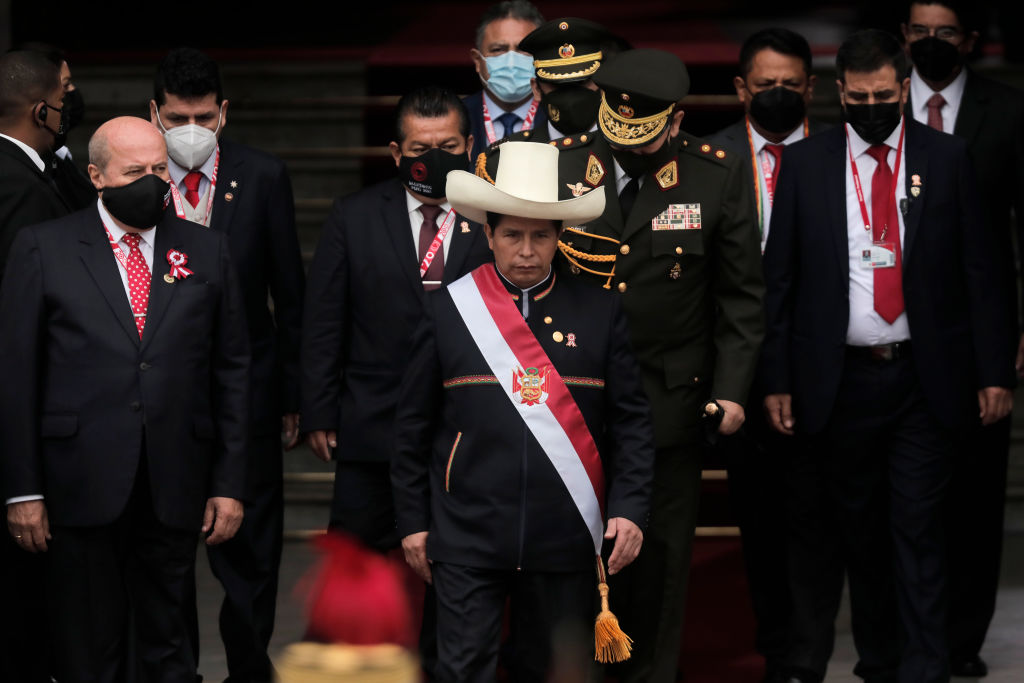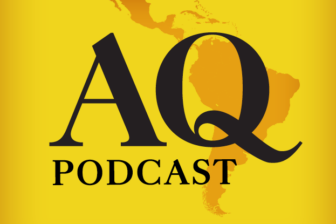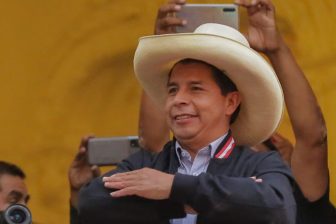Pedro Castillo was finally sworn in as president of Peru on July 28, after more than a month of political uncertainty caused by Keiko Fujimori’s attempt to reverse the electoral results. During that time, it seemed the trepidation his election produced among several sectors of the population had perhaps been overblown: Castillo incorporated more moderate individuals to his team, like Pedro Francke, a left-wing economist who began to meet with investment banks to assure them that the new government would not endanger the country’s economic stability. This was seen as a sign that Castillo was willing to tamp down his radical economic agenda, authoritarian tendencies and links with individuals and organizations sympathetic to the terrorist group Shining Path. It also caused Peruvian pundits to hope that he would not side with the hardline figures within his party Peru Libre, like Vladimir Cerrón, the secretary general of the party and a former governor and Marxist who has been convicted of corruption.
Those hopes were dashed on Thursday, when Castillo named Guido Bellido as prime minister and chief of his Cabinet. Bellido is a congressman for Peru Libre who is currently facing a judicial investigation for apologia for Shining Path. He is also a virulent homophobe and misogynist who, as it happens, is very close to Cerrón. The rest of the Cabinet is also seriously under question: the minister of labor is also reported to have ties with a pro-Shining Path organization, other members have no experience in their appointed sectors. And while Francke finally accepted the position of minister of economy and finance late Friday after reportedly negotiating a degree of autonomy, Cerrón has already expressed on Twitter his desire to sideline the economist, whom he sees as too representative of Peru’s status quo.
Thus, Bellido’s designation has been interpreted by Peruvians in two ways: Castillo has decided to ally himself with the more radical elements of his party, and he is betting on a strategy of confrontation against Congress, which is largely made up of the opposition.
It is not premature to say this decision will likely prove to be Castillo’s undoing, and it is evidence that both he and Cerrón are overestimating the level of popular support for their new government. Castillo has known since his election that he would be facing a very aggressive opposition from many fronts. Peru Libre does not have enough seats in Congress to single-handedly approve laws. The mainstream media immediately aligned itself with the right after the runoff and will now be heavily critical of his policies; the business sector would love to see him removed; and the military, currently without a chief of the Armed Forces (the previous one resigned a few days before Castillo’s swearing in), has refused to symbolically recognize Castillo as commander-in-chief until he names a replacement. His only real source of power was the approval of the population, the majority of which arguably saw him as an alternative to traditional politics and the arrival of a more just economy and society. Just two weeks ago, 50% of citizens reported feeling hope and trust regarding Castillo, according to local pollster IEP.
However, for most Peruvians, anything remotely related to Shining Path is considered an affront. Almost all political sectors have taken Bellido’s designation as such, except Nuevo Peru, the group that represents the progressive left and is also part of the Cabinet. In fact, the move was so odd that some journalists believe it is actually part of a plan by Cerrón and Castillo to provoke Congress into denying the prime minister a vote of confidence, forcing the president to name an entirely new Cabinet, thus paving the way for the dissolution of Congress. Under the Peruvian Constitution, the executive can dissolve the legislature if the latter denies the Cabinet a vote of confidence two times. The speculation is that this would speed up the process of calling for a Constitutional Assembly, one of Castillo’s main objectives, which is very unlikely to happen through normal channels.
Whether or not that was the plan, it appears to have backfired. While several lawmakers have called for Bellido’s resignation, the president of Congress, María del Carmen Alva, from the centrist party Acción Popular, has stated that they will first meet Bellido and hear what he has to say rather than reject him outright. It’s possible that this new Congress is aware of the mistakes made by the previous ones, particularly the legislature dissolved by former President Martín Vizcarra in 2019. They may not want to be seen by the public as the cause of yet another political crisis, knowing that Peruvians have had enough of the constant confrontation between the two powers. Instead, they will leave that role to the president.
There is also another way in which Congress has the upper hand. As the country discovered in recent years, impeaching a president can be a pretty swift affair, since all it takes is two thirds of parliamentary votes (87) and an incident that can be interpreted as “moral incapacity.” Reacting to any threat of dissolution from Castillo by impeaching him first could be fairly easy, all the more so when there is already talk of removing him less than a week into his presidency, even among previous supporters. Given Castillo’s political clumsiness and apparent lack of concern with having corrupt individuals and sympathizers of Shining Path among his ministers, it’s not hard to foresee an impeachment process in the near future.
That’s not the same as saying that removing Pedro Castillo would be equivalent to safeguarding Peru’s democracy, nor that it would put an end to the turmoil the country has experienced since 2016. Castillo’s left may have won the elections, but it’s unclear that it can actually govern, let alone lead the social and economic revolution promised to Peruvians. The failure to do so will only deepen the existing polarization, destabilize the economy and open the way for even more radical, undemocratic options, this time from the far right. And they would not squander the opportunity.









